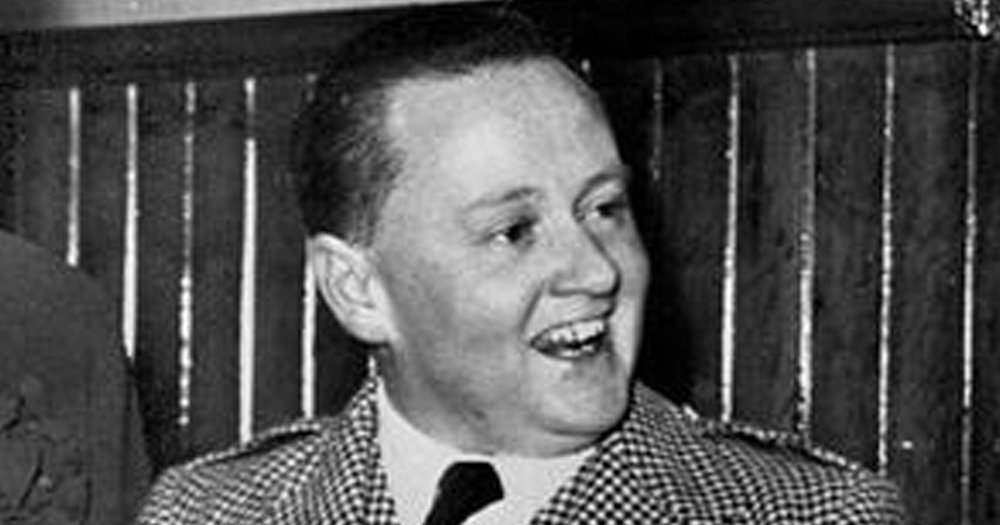Born into the Scottish aristocracy in 1912 to his parents Lord John Forbes-Sempill and Gwendolyn Prodger, Ewan was christened under the name Elizabeth Forbes-Sempill. However, even from a young age, his mother took to calling him “Benji” instead and homeschooled him so he wouldn’t have to go to an all-girls school.
Commenting on his upbringing, Ewan Forbes wrote “…a ghastly mistake. I was carelessly registered as a girl in the first place, but of course, that was forty years ago…the doctors in those days were mistaken, too.”
His father insisted on a “strict Scottish” upbringing, so he learned how to speak and write Doric as well as some European languages. When he was 15 years old, he was allowed to attend a co-educational course in Dresden where, supported by his mother, he visited doctors for an early form of hormone therapy.
Afterwards, he went on to travel through central Europe and chose to stay in Paris to study the Harp and attend lectures at the Sorbonne. When he eventually returned to Scotland he chose to form a group of Scottish country dancers, together with Isabella Mitchell, who would become his housekeeper and, later in life, his wife.
Around this time, Forbes decided he wanted to study medicine. His father believed that there was no need for these studies and refused to fund his further education. Ewan managed to set aside enough money by himself and began to work under psychologist Leonhard Seif in Munich in the 1930s.
Just learnt about Sir Ewan Forbes, a trans baronet who was born in 1912 and passed away in 1991. I hadn’t heard of him before, but a customer told me all about him when buying Zoë Playdon’s book on him. I know what I’m buying next! pic.twitter.com/mcwlwZUM7k
— Al ? (@horridcharms) January 10, 2022
During this time, he would witness the Nazi Party come into power but only returned home upon the death of his father. While his older brother stood to inherit the title, Ewan was left with an estate, which he enthusiastically set about running, together with his companion Isabella Mitchell. Taking on the role of Laird, he is said to have worn the traditional male clothing demanded of the role and avoided upper-class society where he would have been expected to wear feminine attire.
In 1944 he graduated medical school, and in 1952, after the death of his mother, he formally changed his legal gender to male by simply requesting a form for re-registration on the basis that his sex had been identified wrong upon birth. This was possible because before 1970 there was no legal precedent establishing that the sex assigned at birth was categorically not changeable. Ewan went on to perform his duty as a General Practitioner, receiving surprising support from patients after announcing publicly that he would change his name to Ewan.
Self-determination for trans ppl is nothing new. Sir Ewan Forbes changed the sex on his birth certificate in the 40s, announced his new name in the newspaper & legally married his wife. His cousin challenged the change for inheritance, but the judge ruled in Ewan’s favour. pic.twitter.com/wTdscJ6aT4
— Trans Actual (@TransActualUK) November 3, 2022
He lead a quiet life with his wife on their estate for most of his remaining life except for when his older brother unexpectedly died, and he was next in line to inherit the baronetcy. His cousin took him to court contesting the inheritance on the ground that Ewan was formally registered as female. Only men were able to inherit the title and if a court had found Ewan to indeed be female, his cousin would have been next in the line of inheritance. But after an excruciating and long trial, Ewan was confirmed to be a man and was allowed to inherit the title.
This could have set an important precedent for later court cases, but due to the secrecy that surrounded the controversial court case, its last details have only been released in 2021. A book called The Hidden Case of Ewan Forbes: The Transgender Trial that Threatened to Upend the British Establishment by Zoe Playdon takes a closer look at the complicated court case and its proceedings. Due to details mentioned during the prolonged court case, it is most often interpreted that Ewan Forbes was trans however, the possibility that he was intersex also exists.
© 2023 GCN (Gay Community News). All rights reserved.
Support GCN
GCN is a free, vital resource for Ireland’s LGBTQ+ community since 1988.
GCN is a trading name of National LGBT Federation CLG, a registered charity - Charity Number: 20034580.
GCN relies on the generous support of the community and allies to sustain the crucial work that we do. Producing GCN is costly, and, in an industry which has been hugely impacted by rising costs, we need your support to help sustain and grow this vital resource.
Supporting GCN for as little as €1.99 per month will help us continue our work as Ireland’s free, independent LGBTQ+ media.
